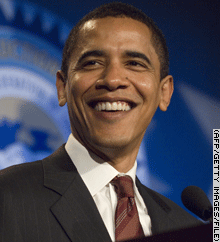
Why issues are giving way to image.
I opened the Obama home page last night before the debate and found - surprise! - a fundraising drive. The Obama campaign has always been a grassroots one. They had recorded some 890,000 donors since the start of the campaign, and they were pushing toward one million. I'd considered donating for Obama before, but something about pushing for the one million mark was even more compelling. By the time I noticed the free T-shirt at the bottom of the page, I was pulling out my wallet.
Switching gears, my boss is naturally drawn to new toys and gadgets. One night, we were talking about motorcycles; the next day, he showed up to work on a brand new bike. Some months later, we were talking about the new MacBook Air and had to convince him not to buy it just because it was new and shiny.
These two stories aren't as disjointed as they seem on the surface. Today, image is king, and that transcends the world of gadgets and toys. Barack Obama has built a campaign founded on his image rather than his issues, and it's proven to be successful. A major criticism of the campaign has been that Obama is nothing more than pretty words and speeches. Many of his supporters can't name many of his policies beyond "change." Yet none of this has had a particular effect on his poll standings. In fact, it may be helpful to him. Obama has an image of a man in touch with the people. He's one of us. Hillary, by contrast, is seen as a Washington elitist. Spouting off facts and information isn't going to help her improve. She's not up against Obama's record of experience, but his image, and she's fighting a losing battle.
Case in point - I chose to make my donation last night because the campaign was shooting for one million donors. That's nothing more than an arbitrary number. The one millionth donor isn't any more important than the one before him, or the one after him. And yet I donated. I got caught up in the image and the feeling of the thing rather than the logic of it. I was doing the exact same thing as my boss who bought a motorcycle because it seemed cool. Donating for Obama last night was cool.
Lest we think this is a new innovation in politics, let's turn back the clock to 2000. Image was what killed the Gore campaign. If the election was on nothing more than issues and experience, Al Gore would have won in a blowout. He was vastly more experienced and knowledgeable on the issues. He was completely comfortable talking facts during the debates and his speeches. And yet, that same confidence was what did him in. His image was nerdy. People didn't want a brainiac in the Oval Office, even though history shows us that America would have turned out completely different had Gore been elected. Instead, America voted for George W. Bush, the candidate who polls consistently showed they'd rather sit down and have a beer with. Issues were nothing. They were actually less than nothing - a mastery of the issues was a liability for Gore.
This is part of the reason Obama is polling so well right now. He's an exciting, energetic candidate who people are naturally drawn to. The issues...well, we can worry about those later. For now, he looks and sounds cool, and that's why he's attracting voters in droves. We may be in for a rude awakening as to his actual governing ability come November, but then again, his image may be powerful enough to blind us to that, too.




